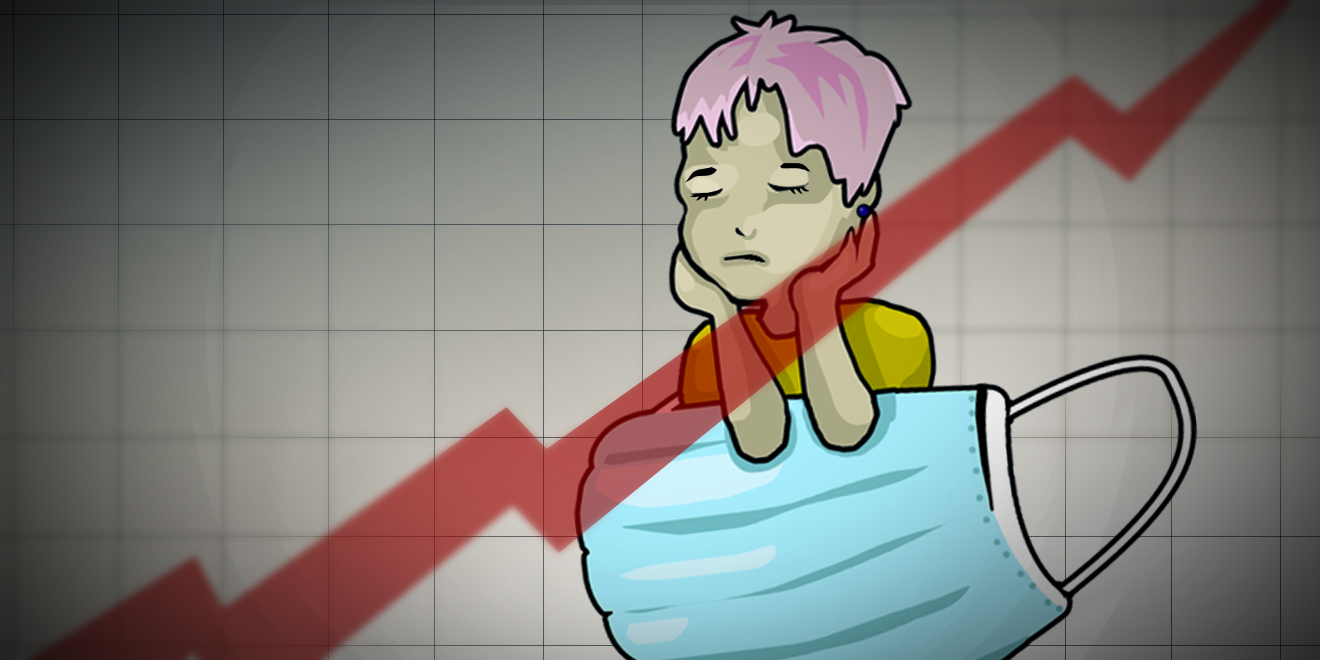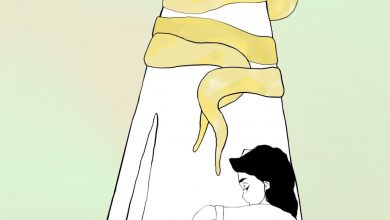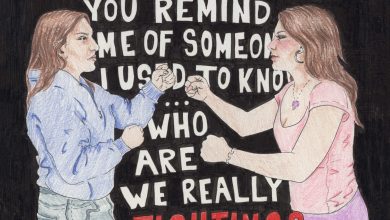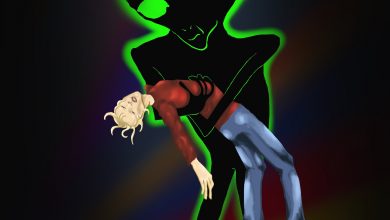Adapting to our New Normal

Design by Emma Lehman
(Image description: A drawing of a person with short pink hair, wearing a yellow t-shirt and resting their elbows on a large surgical face mask which covers their body from the shoulders down. They hold their face, eyes-closed, in their hands, and stand in front of a gridded white background. Superimposed over this image is a red upwards trend line.
When the weekend of March 14th of 2020 arrived in the United States, quarantine came with it. At the time, the public mood was that this was temporary, that even though this was a global pandemic, we’d have this figured out in no time. Perhaps it was a truly American instance of blind faith in public health officials, despite gobs of contrary evidence to their efficacies, or just a pure lack of knowledge of what in the world was actually going on. Regardless, we weren’t prepared for these months of isolation followed by uneven reopening measures. We still have no idea what the next couple years will concretely look like, but we’ve quickly realized that we must adjust our behavior to follow suit.
Well, not all of us. As just as many people are regularly still attending parties, not social distancing, and not wearing masks in public. These actions display a distinct disregard for the public’s well-being and are contrary to principles of revolutionary community that herald widespread public cooperation for healthy communities. The ignorance of the current situation is not something we can afford as a country on top of an utterly inept government handling of this virus. We must adjust our expectations of what everyday life looks like instead of mistakenly hoping COVID will change to accommodate us, because guess what? It won’t, and people will continue to die en masse.
It is important to contextualize individual behavior within the grand scheme of a public health crisis. It is first and foremost the fault of the United States government for not providing its residents with the financial relief and free medical care we needed to survive this pandemic. The federal government has repeatedly insisted that this pandemic is a minor annoyance, rather than a highly contagious, deadly virus. Instead of prioritizing caring for its people, the government spread lies of mask ineffectiveness and encouraged recklessness as the appropriate course of action both for decisions made by the government and by its residents. Many couldn’t afford to stay home from work during quarantine, let alone take off time if they got sick! Individual people’s options are greatly constrained by the choices federal and state governments made for us during this pandemic.
Though college students spreading COVID through partying and get-togethers is the headline story, little question is paid to why they are even on-campus right now in the first place. Profit has been put over people time and time again during this pandemic, and it is never more blatant than when universities brought some or all their students back to school knowing that it would greatly increase their risk and then blamed the students for being the biggest culprits of disease spreading. It is morally incorrect to place the onus on individuals when our governments are doing nothing to fix or even alleviate any of the financial or social burdens of this pandemic.
Despite this unfair blaming, each person’s actions contribute to the well-being of the collective during a public health crisis. It is our responsibility to apply communal praxis and principles to our own lives and take care of each other during this pandemic. Abolition efforts thrive on cooperation of the collective towards a common goal, and in this case, that is the health and safety of our communities. While the United States is not operating under these principles, individuals and their communities must if we want to protect our most vulnerable.
It is often those that believe the least in this communal principle (white people) that have the power to enact the most harm against vulnerable communities (Black and brown people.) White people are less likely than every other racial group to wear a mask, demonstrating a lack of care in prioritizing public health in everyday behavior. This inherent selfishness and sole desire of self-preservation above all else is a distinctly white supremacist notion, one adopted and reinforced by many white people during this pandemic. Whether it is the choice to enter Black and brown neighborhoods without wearing a mask or the subjection of lower-income people to work perilous jobs that increase their exposure to the virus, white supremacist thought is embedded in all facets of this pandemic.
It is the intersections of class and race that have produced the terrain of inequality that made the pandemic much more difficult for some than others. Not only does a dreadful healthcare system keep low-income people from being treated for COVID-19 or obtaining tests, hospitals are intentionally less likely to be built in Black neighborhoods. This is especially deadly in this pandemic, as Black and indigenous people are dying at much higher rates than white people. Black Americans are also much more likely to be essential workers and to have been working since March without a true quarantine. The idea that our new normals are universal and not hugely impacted by one’s socioeconomic and racial identity ignores the immense privilege that those who could stay home from work had in protecting themselves from this disease. Capitalism, palpably informed by racism and white supremacy, chooses who lives and dies and prioritizes economic prosperity over human life day after day. Therefore it is crucial as communities focused on abolition that we do our best to fill those gaps and provide the necessary mutual aid that prioritizes minority communities most affected by this pandemic and our country’s medical and economic racism.
Although communal support is more necessary than ever, it is crucial that we handle our friendships and relationships wisely so as to protect every person we are in contact with. A disregard for the increased risk of transmission with bigger groups completely forgoes the idea that we’re protecting ourselves to protect others—instead we’re disrespecting all parties by engaging with them in the first place. There is an inclination to rationalize personal bad behavior by looking at that of others, thereby feeding into an endless cycle of selfishness and narcissism while simultaneously founding their beliefs on being swayed by herd mentality. And how would this behavior be anything but continuously validated when the public is receiving virtually no guidance on how to go about conducting our lives safely? General guidelines on quarantine bubbles and maintaining six feet from others do not touch on the nuances of disease transmission and how we practically minimize it.
We must be extremely cautious in who we are spending maskless time with, especially in our capabilities to spread it to others without showing symptoms. One cannot possibly know the treelike network of all the interactions of all the people they’re hanging out with, and it becomes more and more likely that someone will either get the virus or that they spread it to someone who can’t fight it. Just because you don’t live around immunocompromised people doesn’t negate your responsibility in protecting others’ families who do. Individualism is bred as a dictation of how to conduct oneself in America, and we must reject every notion of this that lauds the idea that caring about our own welfare goes above the protection of others. The specific decisions to be made by individuals in response to COVID-19 that are high in vigilance may vary in application, but they all bear the same theme of intentionality in all of our actions and movements. Being cautious is not only for your own sake, but for every person that you’re seeing, and every person they’re seeing too.
The fight against COVID-19 is practically non-existent by our state powers, so it is the responsibility of us as individuals to take the necessary measures to keep our communities safe, because the government will not. Marginalized people have been put at an extremely unprotected position in this pandemic, given no aid or relief to stay home from work and keep themselves safe while rich white people have been given tax breaks to further increase their advantage. Despite the privilege seeping out of this crisis, this time has also seen unprecedented levels of communal caregiving born from the desire to care for our vulnerable communities. Self-seeking mindsets in communal efforts will never accomplish the mutual aid that needs to be present to survive a pandemic like this, so American individualism needs to be rejected at every opportunity. While we cannot solve this crisis without extensive work, we must take the small steps in our personal lives to protect ourselves, our families, and our communities.




